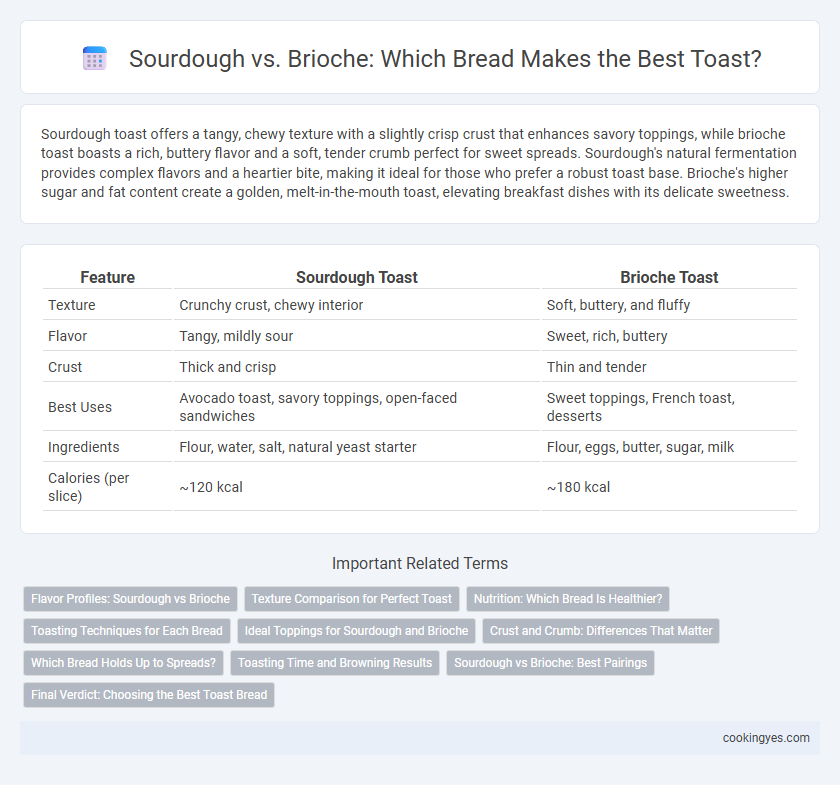Sourdough toast offers a tangy, chewy texture with a slightly crisp crust that enhances savory toppings, while brioche toast boasts a rich, buttery flavor and a soft, tender crumb perfect for sweet spreads. Sourdough's natural fermentation provides complex flavors and a heartier bite, making it ideal for those who prefer a robust toast base. Brioche's higher sugar and fat content create a golden, melt-in-the-mouth toast, elevating breakfast dishes with its delicate sweetness.
Table of Comparison
| Feature | Sourdough Toast | Brioche Toast |
|---|---|---|
| Texture | Crunchy crust, chewy interior | Soft, buttery, and fluffy |
| Flavor | Tangy, mildly sour | Sweet, rich, buttery |
| Crust | Thick and crisp | Thin and tender |
| Best Uses | Avocado toast, savory toppings, open-faced sandwiches | Sweet toppings, French toast, desserts |
| Ingredients | Flour, water, salt, natural yeast starter | Flour, eggs, butter, sugar, milk |
| Calories (per slice) | ~120 kcal | ~180 kcal |
Flavor Profiles: Sourdough vs Brioche
Sourdough toast offers a tangy and slightly sour flavor with a chewy texture, rich in natural wild yeast and bacteria fermentation notes. Brioche toast features a buttery, sweet, and delicate crumb, delivering a soft and airy bite with a rich, egg-enriched taste. Choosing between sourdough and brioche for toast depends on whether you prefer a bold, tangy complexity or a rich, sweet indulgence in your breakfast.
Texture Comparison for Perfect Toast
Sourdough toast offers a crisp, chewy texture with a tangy flavor that crisps evenly while maintaining a slightly dense crumb. Brioche toast boasts a rich, buttery softness and a tender crumb that caramelizes quickly on the surface, creating a luxuriously smooth bite. For perfect toast, sourdough excels in crunch and structure, while brioche delivers a melt-in-the-mouth, velvety texture.
Nutrition: Which Bread Is Healthier?
Sourdough bread offers higher nutritional benefits with lower glycemic index and more probiotics due to its natural fermentation process, promoting better digestion and blood sugar control. Brioche, rich in butter and eggs, contains higher calories and saturated fats, making it less favorable for heart health but providing more protein. For a healthier toast option, sourdough is typically recommended due to its nutrient density and gut-friendly properties.
Toasting Techniques for Each Bread
Sourdough toast benefits from a medium-high heat to enhance its natural tangy flavor and create a crisp, chewy crust, while maintaining a soft interior. Brioche toast requires a gentler, lower heat to preserve its rich, buttery texture and golden color without burning the sugar content. Using a toaster oven or skillet with precise temperature control helps achieve optimal browning and texture for each bread type.
Ideal Toppings for Sourdough and Brioche
Sourdough toast with its tangy flavor and chewy texture pairs exceptionally well with savory toppings such as avocado, smoked salmon, and goat cheese, enhancing its complex taste. Brioche toast, known for its rich, buttery crumb and slight sweetness, complements sweet toppings like fresh berries, honey, and mascarpone, creating a luxurious balance. Both breads offer unique bases that elevate toppings, making sourdough ideal for bold flavors and brioche perfect for indulgent, dessert-like combinations.
Crust and Crumb: Differences That Matter
Sourdough toast boasts a thick, crunchy crust with an open, airy crumb that delivers a tangy flavor and chewy texture ideal for savory toppings. Brioche features a thin, tender crust and a soft, buttery crumb with a slightly sweet taste, making it perfect for rich or sweet accompaniments. These crust and crumb differences influence the overall toast experience, where sourdough offers robustness and brioche provides a delicate, melt-in-the-mouth quality.
Which Bread Holds Up to Spreads?
Sourdough toast holds up better to spreads due to its dense, chewy crumb and tangy, robust crust that prevents sogginess. Brioche's airy, buttery texture absorbs spreads quickly, making it susceptible to becoming soggy and losing structure. For hearty toppings like avocado or jam, sourdough provides a sturdy base that maintains its integrity.
Toasting Time and Browning Results
Sourdough toast typically requires a longer toasting time due to its dense, chewy texture, resulting in a crisp exterior with deep, caramelized browning that enhances its tangy flavor. Brioche, with its buttery and soft crumb, toasts more quickly and develops a golden-brown color with a slightly sweet taste and delicate crunch. Choosing between sourdough and brioche for toast depends on the desired balance of toasting time and the richness of browning effects.
Sourdough vs Brioche: Best Pairings
Sourdough toast pairs exceptionally well with savory toppings like avocado, smoked salmon, and sharp cheeses due to its tangy flavor and chewy texture that balance richness. Brioche toast, rich and buttery with a tender crumb, complements sweet spreads such as jam, honey, or fresh berries, enhancing its soft, slightly sweet profile. Choosing between sourdough and brioche for toast depends on whether you prefer a robust base to support hearty toppings or a delicate foundation to highlight sweet flavors.
Final Verdict: Choosing the Best Toast Bread
Sourdough offers a tangy flavor and chewy texture with a crisp crust, ideal for savory and hearty toppings, while brioche provides a rich, buttery taste and soft crumb, perfect for sweet or delicate spreads. The best toast bread depends on your flavor preference: sourdough suits those seeking complexity and robustness, and brioche caters to those desiring sweetness and tenderness. For versatile everyday toast, sourdough balances health benefits and texture, but brioche excels in indulgent or dessert-style toast applications.
Sourdough vs Brioche for Toast Infographic

 cookingyes.com
cookingyes.com